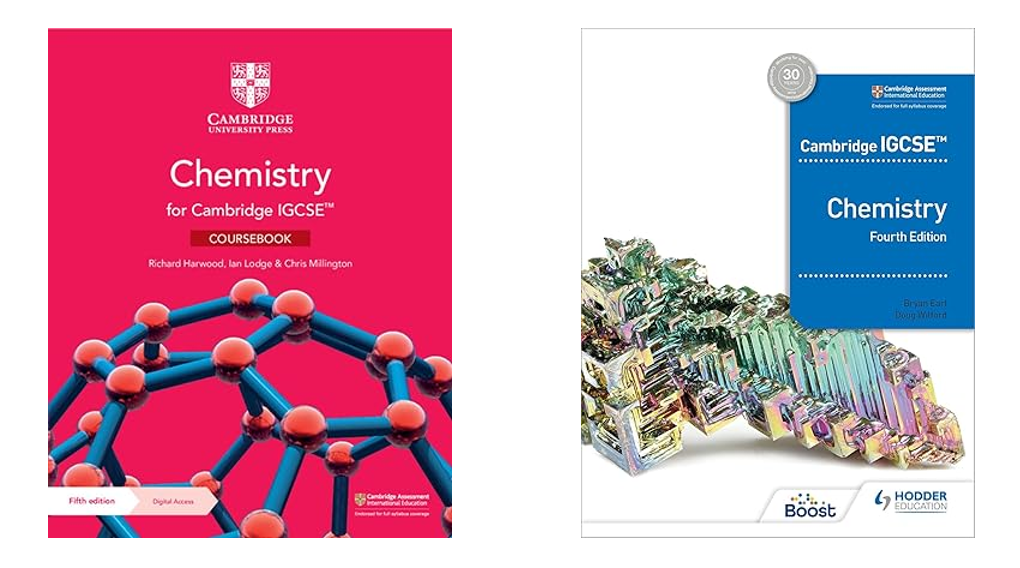
IGCSE Chemistry is a foundational course designed to introduce students to the principles and concepts of chemistry. It covers a wide range of topics essential for understanding chemical reactions, the behavior of substances, and the applications of chemistry in everyday life. Here’s an overview of the key topics typically covered in IGCSE Chemistry:
### Key Topics
1. **The Particulate Nature of Matter**
– States of matter (solid, liquid, gas)
– Kinetic theory of gases
– Changes of state
2. **Experimental Techniques**
– Methods of purification and separation
– Techniques for qualitative and quantitative analysis
3. **Atoms, Elements, and Compounds**
– Atomic structure and the periodic table
– Chemical bonding (ionic, covalent, metallic)
– Types of substances (elements, compounds, mixtures)
4. **Stoichiometry**
– Balancing chemical equations
– Mole concept and calculations
– Percentage composition and empirical formulas
5. **Chemical Energetics**
– Energy changes in chemical reactions
– Enthalpy changes (endothermic and exothermic reactions)
– Hess’s Law and calorimetry
6. **Electrochemistry**
– Redox reactions (oxidation, reduction)
– Electrolysis and its applications
– Electrochemical cells and their components
7. **Acids, Bases, and Salts**
– Definitions and theories of acids and bases
– pH scale and indicators
– Neutralization reactions and salt formation
8. **Reaction Kinetics**
– Rate of reaction and factors affecting it (temperature, concentration, catalysts)
– Collision theory
9. **Chemical Equilibria**
– Dynamic nature of equilibrium
– Le Chatelier’s principle
– Equilibrium constant (Kc) and its calculation
10. **The Periodic Table**
– Trends in the periodic table (atomic radius, ionization energy, electronegativity)
– Group trends (alkali metals, halogens, noble gases)
11. **Transition Metals**
– Properties and uses of transition metals
– Coordination compounds and complex ions
12. **Organic Chemistry**
– Introduction to organic compounds and functional groups
– Hydrocarbons (alkanes, alkenes, alkynes)
– Alcohols, carboxylic acids, and their derivatives
### Practical Skills
– **Laboratory Techniques**:
– Conducting experiments safely and accurately
– Recording and interpreting data
– Analyzing experimental uncertainties and errors
### Exam Preparation
1. **Understand the Syllabus**:
– Familiarize yourself with the specific IGCSE Chemistry syllabus provided by your exam board (e.g., Cambridge, Edexcel).
– Identify the key topics and concepts you need to study.
2. **Regular Practice**:
– Solve past exam papers and practice questions to understand the format and types of questions asked.
– Practice numerical problems and chemical equations.
3. **Conceptual Understanding**:
– Focus on understanding the underlying principles and mechanisms rather than memorizing reactions or facts.
– Use diagrams and real-life examples to grasp complex concepts.
4. **Use of Formulas and Equations**:
– Memorize key chemical formulas and equations.
– Practice balancing chemical equations and solving stoichiometry problems.
5. **Review and Revision**:
– Regularly review your notes and textbook.
– Use revision guides and online resources to reinforce your understanding.
### Resources
– **Textbooks and Revision Guides**:
– Use recommended textbooks that cover the IGCSE Chemistry syllabus in detail.
– Revision guides can provide concise summaries and practice questions.
– **Online Resources**:
– Websites like Khan Academy, BBC Bitesize, and Chemguide offer tutorials and practice problems.
– Online forums and study groups can provide additional support and insights.
By thoroughly understanding the topics, practicing regularly, and utilizing available resources effectively, you can excel in your IGCSE Chemistry exam and build a strong foundation for further studies in science and chemistry-related fields.

